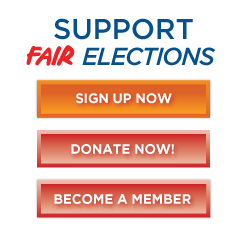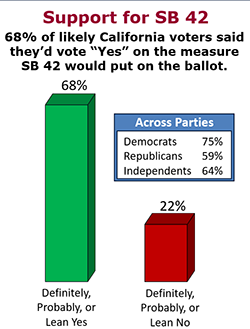Politicians have come up with myriad alleged reasons for
the dismal vote turnouts seen across California in this
spring's municipal elections -- not even reaching 10
percent of eligible voters in the state's biggest city, Los
Angeles.
Bad timing, some suggest. Too many elections, others say.
Another excuse: not enough news coverage.
But these rationalizations ignore a fundamental reality of
today's politics. Voters just don't trust politicians,
believing many have been bought by special interests making
unlimited, often anonymous donations under the U.S. Supreme
Court's infamous "Citizens United" decision, which declared
that corporations have some of the same rights as
people.
Because Supreme Court justices serve for life and several
who voted for Citizens United are relatively young, that
decision won't be reversed anytime soon. So anyone
believing that openness and transparency can create trust
in government must look elsewhere for solutions.
One that many believe can be effective is immediate,
prominent disclosure of the biggest funders of political
campaigns and advertising both for individual candidates
and ballot propositions.
Enter California's proposed "Disclose Act," a putative law
that's been on the drawing board in the Legislature for
more than five years. It would require the top three
funders of ballot measure ads be shown clearly in the ads
themselves. And it requires the donors listed in the ad be
the original sources of the cash, forbidding the use of
committee names often employed to conceal the identities of
the original contributors.
While this doesn't require similar disclosure of donors to
so-called independent expenditure committees backing
individual candidates, it's a big step in the right
direction. Donors to the candidates themselves are listed
on the secretary of state's website.
Backed by the California Clean Money Campaign and more than
400 other organizations, the Disclose Act re-emerged in the
Legislature in March, co-sponsored by Democratic
Assemblymen Jimmy Gomez of Los Angeles and Marc Levine of
Marin County. It's now also known as AB 700.
"The goal … is to press for greater
transparency at who's trying to hide behind these
magnificently titled political committees, expose their
true identities and motives," said Gomez.
It's anybody's guess whether voters watching TV and
Internet ads would pay attention to this information if
offered. But at least this would give them the chance to
understand what and who is behind the ads blasted at
them.
Would it have worked with something like last fall's
Proposition 45? That measure, aiming to regulate health
insurance prices just like car insurance and property
coverage premiums already are, led in polls by about 10
percent when the campaign around it began in July of last
year.
But a $55 million ad campaign, seemingly ubiquitous for
months on both radio and television, reversed that margin
and led the initiative to lose by 59-41 percent.
The measure was opposed by the California Medical
Association doctors' lobby and the California Hospital
Association, among others. They feared controlling
insurance premiums would cut into their members' income.
The endings of their ads also contained fine print and
barely audible statements saying they were paid for by the
state's biggest health insurance carriers, Kaiser
Permanente, Blue Shield, the parent company of Anthem Blue
Cross and HealthNet.
The result made it plain almost no one read the fine print
or heeded the sotto voce disclosure statements, let alone
checked out the secretary of state website. The ads turned
around about 1 million voters, as effective a campaign as
the state has seen in years.
Things might have been different had the Disclose Act been
around. Would voters who knew the message was sponsored by
Big Health Insurance still have changed their minds and
chosen today's unregulated health insurance premiums? It's
speculative to say that disclosure would have prevented the
turnaround in voters' opinion on insurance rate regulation,
but the Disclose Act at least would have let them know who
was trying to influence them.
All of which means that although the latest version of the
Disclose Act would still leave plenty more to be done, it
would be a big step toward voters' understanding the
political process and leveling a playing field that now
tilts markedly toward large corporations.
Thomas D. Elias is a writer in Southern
California.











